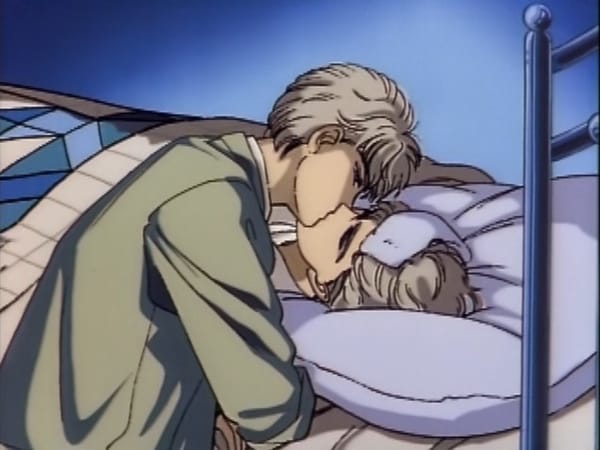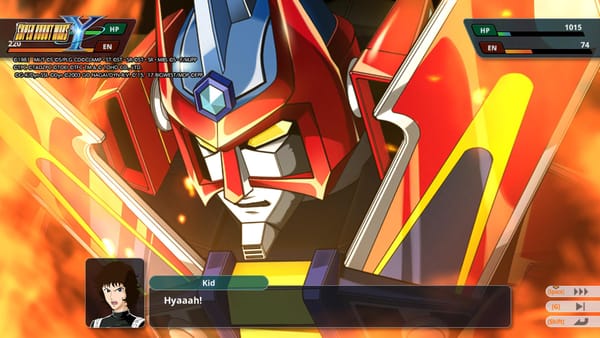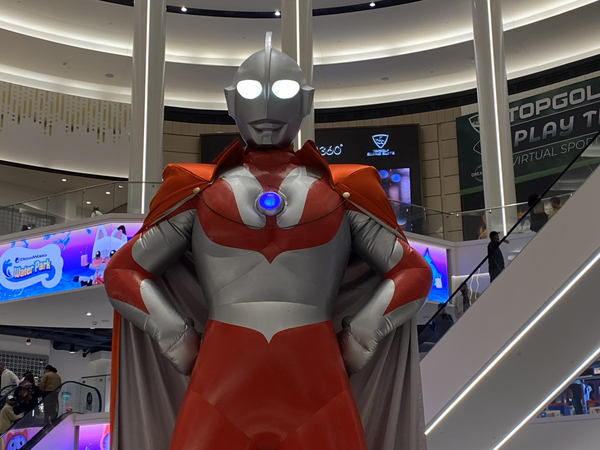What did Melty Blood Type Lumina Do Right?
A game that knows its audience
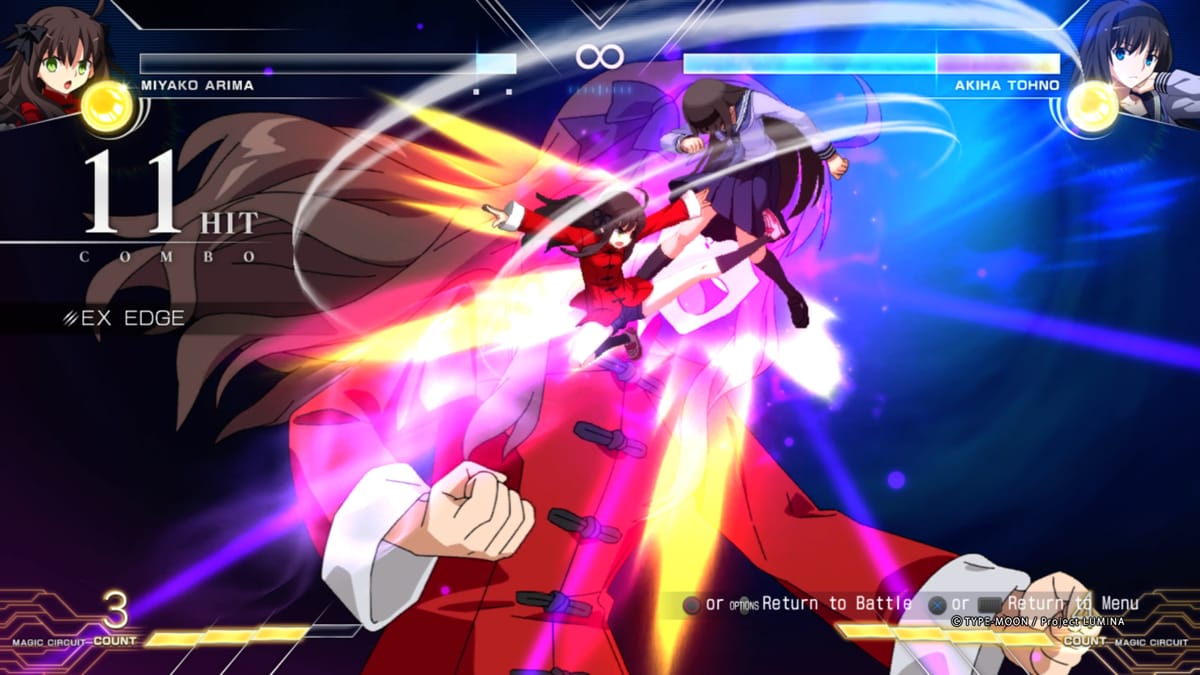
If you’re interested in why Melty Blood is an important cult favorite fighting game, please see my Medium post about it (along with a wealth of other work from me!). Today I’m going to skip the history.
At Anime NYC, two friends of mine— serious Type-Moon devotees— asked me how the fighting game community was taking to the new Melty Blood game. They were pleased with it, but wondering if maybe fighting game players had different priorities than their own, and if there was some tiny issue that they couldn’t see that I could.
I told them that everyone was happy— even though a lot of us really wanted to see Aoko Aozaki come back— and they were pleased to hear it.
The developers added Aoko a couple of weeks later, because they know their audience.
Melty Blood Type Lumina is not a mainstream title. While the Melty Blood games are in fact quite easy to pick up and play, they are unlikely to be anyone’s first fighting game. After all, the series is a spinoff of a 20-year-old cult classic indie visual novel. If you’re interested in Melty Blood, you’re probably a pretty big video game nerd to begin with.
There are two key groups of fans that a new Melty Blood game must satisfy:
The Type-Moon fan. I’m not going to explain Fate and Tsukihime or we’d be here all day, but Type-Moon is adept at creating the kind of engaging, lore-heavy fantasy worlds that nerds cannot help but research obsessively, and they’re also adept at creating appealing characters that capture their hearts and telling stories that break them. (I’m a Rin Tohsaka man, personally).
It’s thus very important that Melty Blood maintain the atmosphere and character detail that these works are known for. If the game doesn’t get these elements right, it disillusions the diehards and dilutes the whole brand.
The Melty Blood player. Both in the Japanese and global fighting game scenes, Melty Blood (particularly the final revision, subtitled Actress Again: Current Code) is a beloved title among hardcore genre fans. It’s an easy, fun game to pick up and play, but there’s a great deal of player freedom and tactical depth just below the surface. The game design and its philosophy are rock solid; it’s exactly the kind of game certain folks want to play. And quality online play has been available for years. Melty Blood is a fighting game player’s fighting game.
Fighting game players have conservative tastes, and Melty Blood players want the new game to play like the old: speedy, movement-oriented, heavy on air combat and tricky offense. They also want to play as the same core characters that they’ve been comfortable with for over a decade.
Also, everybody wants to hear more music by raito, whose soundtrack for MBAACC is revered.
Satisfying the Type-Moon fan
I’m going to sound like an old man here, but I don’t think people appreciate 2D pixel art like they should. It’s a dying art, and developers like French Bread are some of the only people in the world still taking on the challenge of animating large characters in pixels. Even Arc System Works has moved on to its own distinctive 3D techniques to emulate 2D anime.
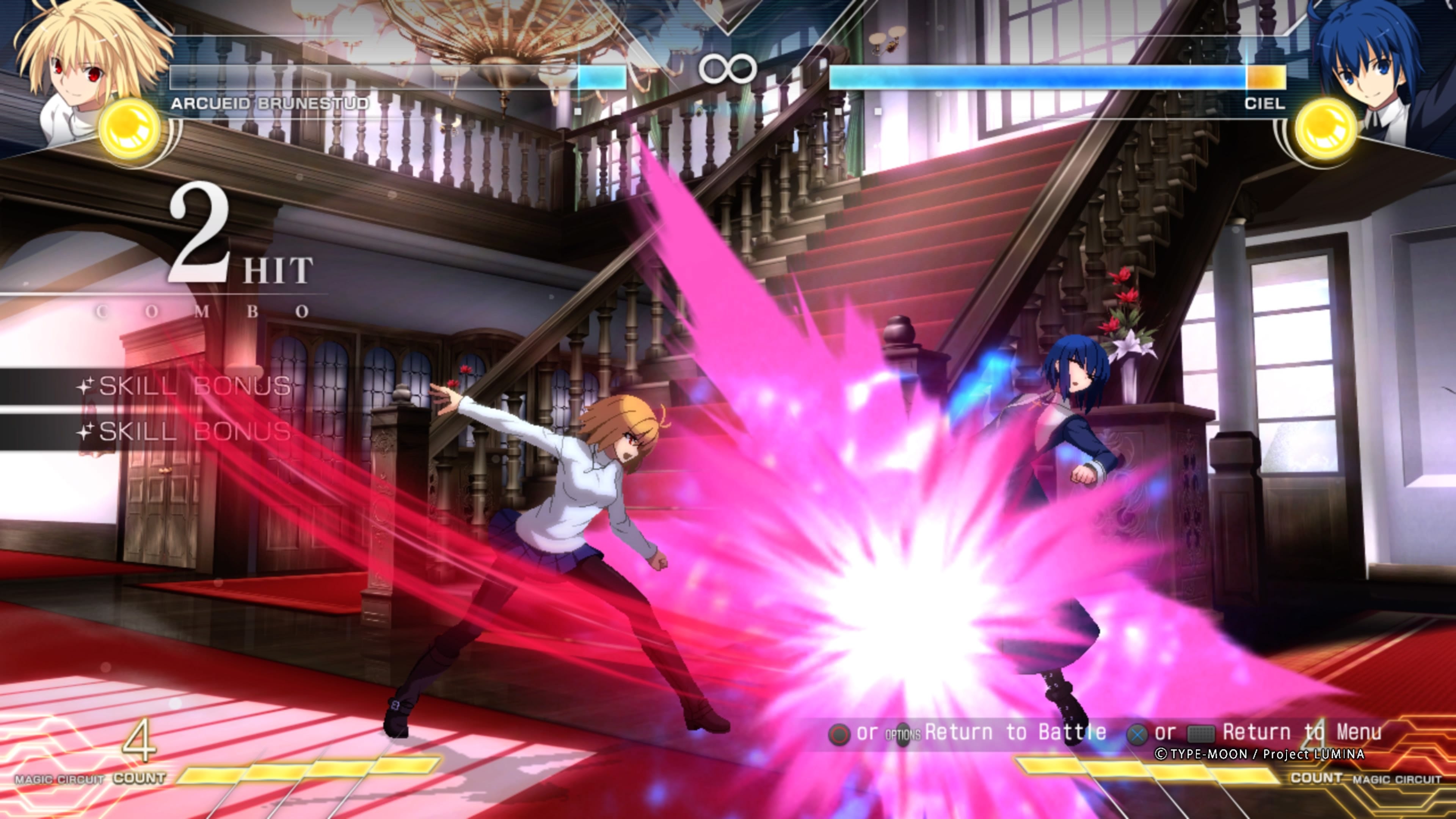
Tsukihime requires an anime look, in any case, and French Bread delivers what nobody else can. The character sprites in this game are just shockingly gorgeous. You really need to see the game in motion at full resolution to completely get it: Youtube and the like do it no justice. The crispness of the sprites, the smoothness of the animation, the subtle movements of hair and cloth; they nailed it.
Additionally, the animated cut-ins from Studio A-1 boast TV anime authenticity and equally exacting detail. My favorite cut-in is when a character enters Moon Drive mode, and not only do we get the cut-in of the character who is powering up, but also the shocked “oh no!” reaction of the character on the other end. It’s not something games think about; it’s perfectly anime.
This is not a real commercial for a real Neco-Arc action figure but I love it.
For lore-hounds, there’s an extensive story mode that spirals off into chaos presided over by the lovable, heavily memed mascot Neco-Arc. By the end of this mode, the developers have apologized via the cat for not including every character they wanted to, because after all, the visual novel Tsukihime remake is only half complete and we wouldn’t want to ruin anything.
And of course, if you’re a Fate fan who doesn’t know about Tsukihime, the developers went ahead and put the iconic Saber into the game as a playable fighter. Why’s she here? She doesn’t know either. Let’s sell some copies!
Satisfying the fighting game fan
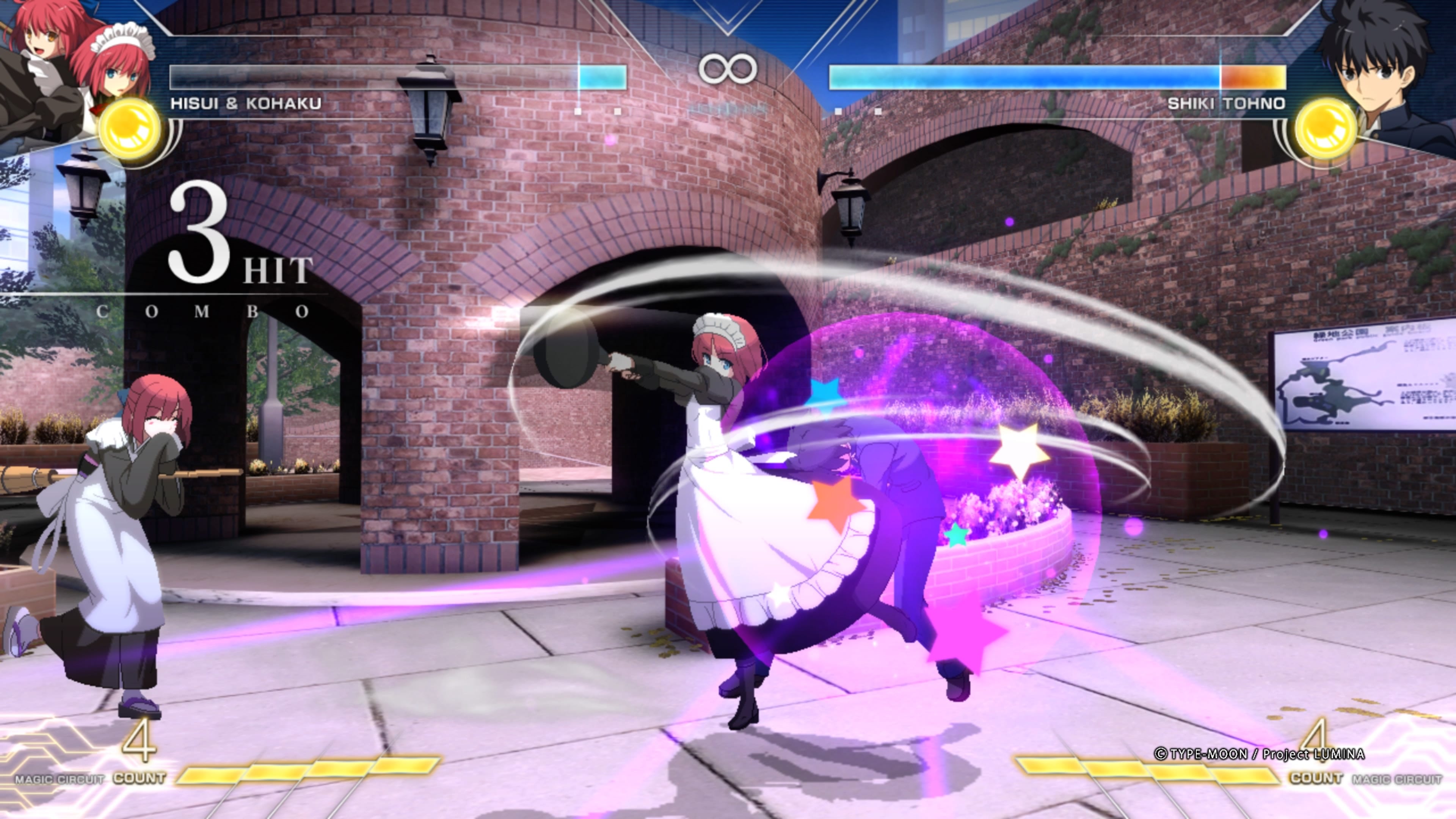
Where the new Tsukihime’s story could allow for it, most of the core cast returns for Melty Blood Type Lumina. You’ve got the all-rounder Shiki, the berserker Arcueid, the agile Ciel, the rushdown artist Akiha, and of course the tricky maids Kohaku and Hisui. The base roster is small compared to mainstream fighting games, but there’s a choice for any fighting style you could think of.
Characters who are minor in the Tsukihime lore but beloved as Melty Blood fighters make the cut too, like explosive kung-fu girl Miyako Arima and beastly grappler Kouma Kishima. Aside from the characters from the new Tsukihime story, the characters who made it into Type-Lumina are all characters that hardcore Melty Blood players would agree “must” be in the game. The new characters, drawn from the remake, fit right in. (With the possible exception of a certain Dead Apostle, who looks like a lost design from Fate:Grand Order.)
Though it obviously boasts fewer characters, the basic gameplay of Type Lumina hasn’t been slowed down or stripped down in any way from the old Melty Blood. It’s still a game about two players bouncing and hopping across the screen, hoping to catch each other on their blind side. It’s precisely that movement and speed that make the game fun.
A few new systems give players more options for defense in a game where the rushdown could get pretty oppressive. Some parts are controversial (the powerful new changes made to shield), but the Moon Drive power-up system and Moon Skill special moves seem to have gone over just fine.
“The Melty Blood Combo” and accessibility
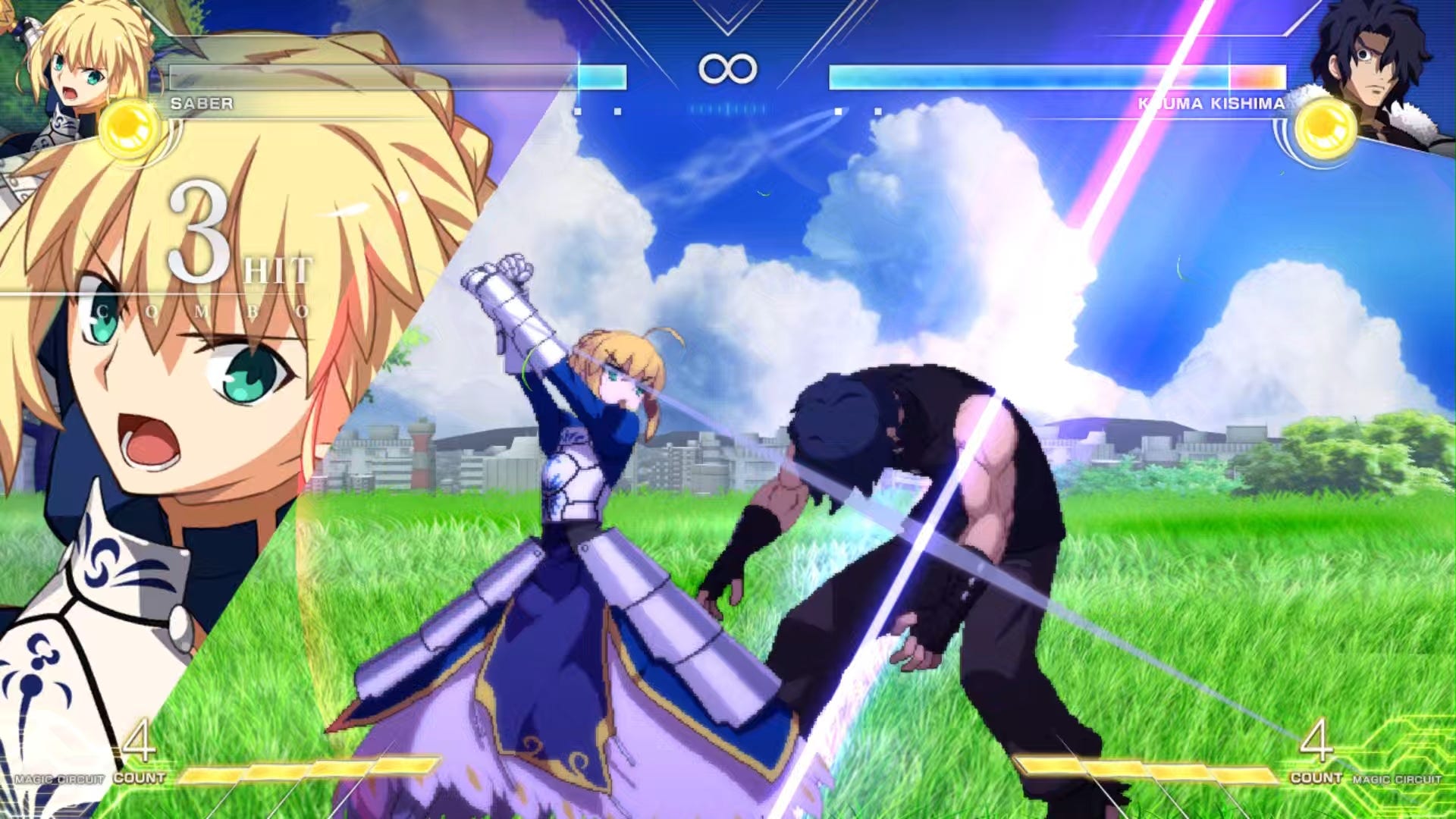
Melty Blood has a simple basic combo structure that players learn immediately upon starting the game. You land a couple of hits, then a launcher, typically down-forward+hard attack. Then you follow the opponent up into the air, land two hits, jump, land two more hits, and end with an air throw to take the opponent back down to ground. Even if you don’t know anything at all about how a character works, you can always use this combo and do good damage. Any seasoned fighting game player quickly learns to pull it off.
So Type Lumina takes that combo and automates it, so that anyone at all can do it. “Any fighting game player” isn’t “anyone,” but it’s not a hard gap to cross. Just mash any of the attacks repeatedly and you’ll see your character go into the basic Melty Blood air combo. You can still do the juggle combo the old way, and you can still roll your own perfect combo using the game’s complex systems, but now anybody who so much as picks up the controller can deal reasonable damage.
As I’ve said in the past about Guilty Gear Strive, I think this is a good thing because “reasonable damage” should be a baseline, not something players should have to struggle for as soon as they start.
On the expert side, auto-combos are a tool unto themselves when used with traditional combo techniques, opening up some combo tricks that weren’t possible in the original game. (I actually used one as part of the “advanced” combo earlier in this review.)
Know your audience
The flow in AAA (maybe AA?) fighting games has been to simplify and streamline. That’s understandable: the reworked Guilty Gear Strive really did widen its audience.
But Melty Blood doesn’t really need to widen its audience. It already knows who it’s for. Type-Moon’s faithful supporters keep the record-breaking, wallet-crushing gacha game Fate: Grand Order afloat; they consider $60 for a video game a light impulse buy. Meanwhile, hardcore fighting fans have been dreaming of and praying for this game— as they actively played its predecessor!— for over a decade. Melty Blood already has its people, and its job is simply not to let them down. Safe to say they’ve succeeded.
